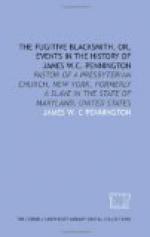I now returned with all my renewed powers to the great theme—slavery. It seemed now as I looked at it, to be more hideous than ever. I saw it now as an evil under the moral government of God—as a sin not only against man, but also against God. The great and engrossing thought with me was, how shall I now employ my time and my talents so as to tell most effectually upon this system of wrong! As I have stated, there was no Anti-Slavery Society then—there was no Vigilance Committee. I had, therefore, to select a course of action, without counsel or advice from any one who professed to sympathize with the slave. Many, many lonely hours of deep meditation have I passed during the years 1828 and 1829, before the great anti-slavery movement. On the questions, What shall I do for the slave? How shall I act so that he will reap the benefit of my time and talents? At one time I had resolved to go to Africa, and to react from there; but without bias or advice from any mortal, I soon gave up that, as looking too much like feeding a hungry man with a long spoon.
At length, finding that the misery, ignorance, and wretchedness of the free coloured people was by the whites tortured into an argument for slavery; finding myself now among the free people of colour in New York, where slavery was so recently abolished; and finding much to do for their elevation, I resolved to give my strength in that direction. And well do I remember the great movement which commenced among us about this time, for the holding of General Conventions, to devise ways and means for their elevation, which continued with happy influence up to 1834, when we gave way to anti-slavery friends, who had then taken up the labouring oar. And well do I remember that the first time I ever saw those tried friends, Garrison, Jocelyn, and Tappan, was in one of those Conventions, where they came to make our acquaintance, and to secure our confidence in some of their preliminary labours.
My particular mode of labour was still a subject of deep reflection; and from time to time I carried it to the Throne of Grace. Eventually my mind fixed upon the ministry as the desire of my whole heart. I had mastered the preliminary branches of English education, and was engaged in studying logic, rhetoric, and the Greek Testament, without a master. While thus struggling in my laudable work, an opening presented itself which was not less surprising than gratifying. Walking on the street one day, I met a friend, who said to me, “I have just had an application to supply a teacher for a school, and I have recommended you.” I said, “My dear friend, I am obliged to you for the kindness; but I fear I cannot sustain an examination for that station.” “Oh,” said he, “try.” I said, “I will,” and we separated. Two weeks afterwards, I met the trustees of the school, was examined, accepted, and agreed with them for a salary of two hundred dollars per annum; commenced my school, and succeeded. This was five years, three months, and thirteen days after I came from the South.




